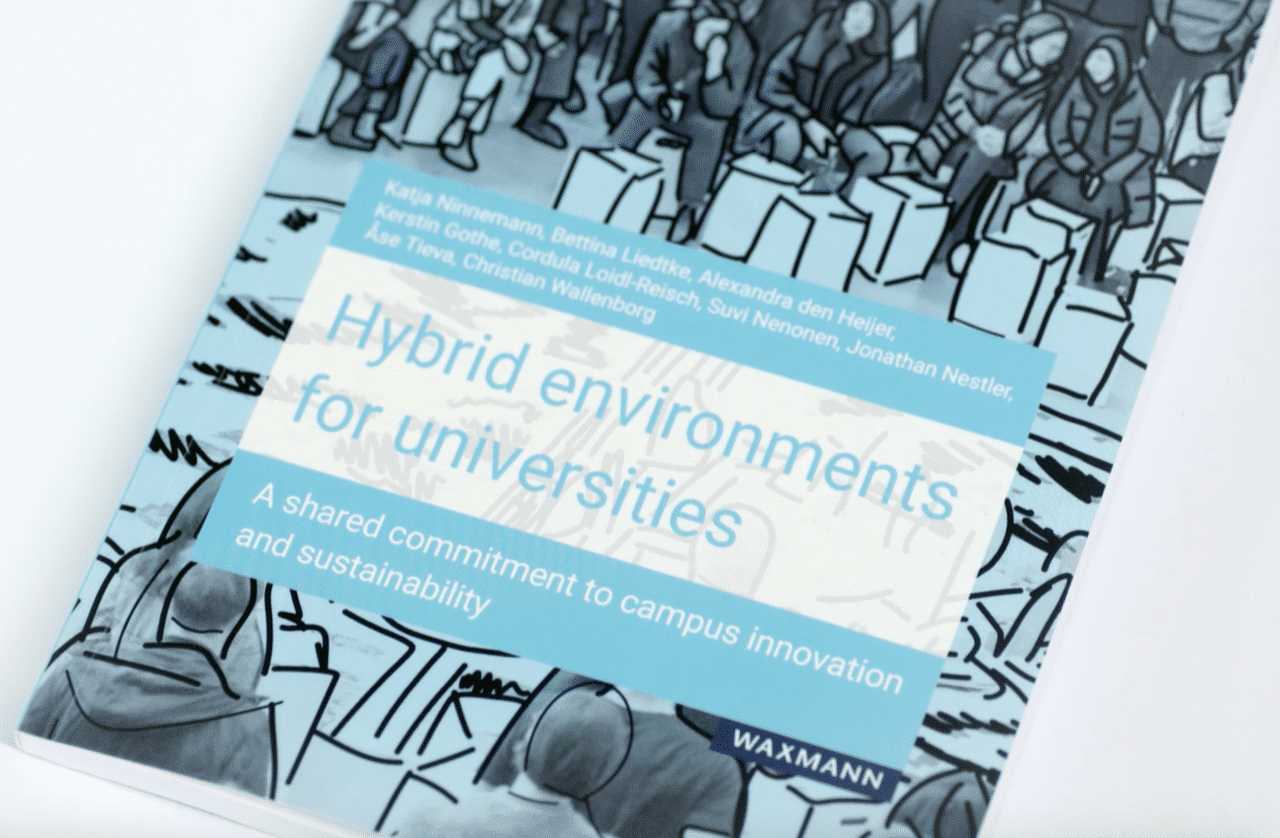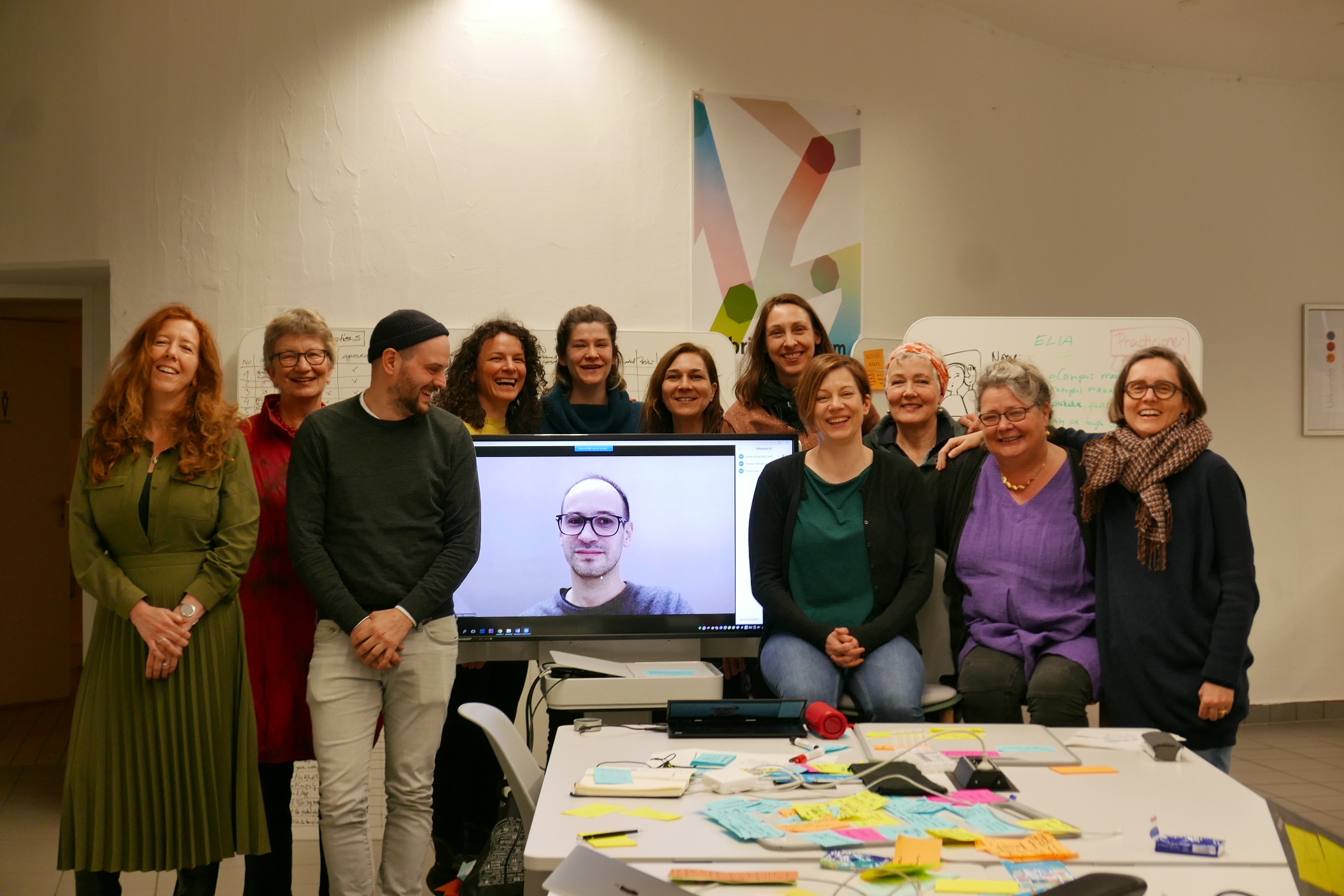Celebrating “Hybrid Environments for Universities”, the book launch webinar
“Hybrid Environments for Universities: a shared commitment to campus innovation and sustainability” was our last Book Sprint facilitated onsite. It took place last March at Hybrid Lab of Technical University (TU) Berlin. Six months and a somewhat different world later, we had the digital book launch event with the authors of the book, the publisher Waxmann Verlag and Steelcase, the provider of the pop-up space where we worked together during the 5 days of this Book Sprint.
Webinar recording: with Karina Piersig (Book Sprints Ltd), Katja Ninnemann (Corporate Learning Architect), Veronika Taube (Steelcase), Melanie Völker (Waxmann) and the authors of the book
Among the attendees of the webinar were project managers, professors, providers from the library and publishing sectors, consultants for learning spaces and education directors. It was easy to perceive from the beginning an overall consensus around how prominent the subject is, since right after this Book Sprint took place, the world was put into a lockdown that paused most activities, especially in learning institutions. As people are slowly resuming gatherings and events, reflecting and developing hybrid solutions for learning spaces is definitely a topic on the table of the target audience to whom this book was intended for. One of the authors and organiser of the project , Dr. Katja Ninneman, stated:
This book is exactly about what is happening now. We were writing a manifest about hybrid environments and it wasn’t because of Covid-19, we already had a lot of things to discuss on the topic of learning spaces, it was a field that has a lot of challenges. (…) This manifest is about how to create sustainable and innovative learning environments. This is exactly what we need now in these times as we already experience a very special environment to be living and working together. We do need different processes in creating these spaces, different contributors to think about these processes.

The printed version of the book
Collaboration was a key aspect to design the partnership with Steelcase and Waxmann Verlag for this Book Sprint. Veronika Taube, workplace consultant at Steelcase, explained how the pop-up space was meant to create a highly flexible environment, with options of plenary as well as individual working stations within an already existing layout. Melanie Völker, editor at Waxmann Verlag, pointed out that authors come to the publisher saying how collaborative writing is becoming more important, as well as the interdisciplinary cooperation, that is, when someone else is working on a similar topic from a different point of view, and what can be done to connect them. She concluded:
As a publisher it is not only my job to publish books, but to help authors work together and since these cooperations are getting more important, I was very curious and happy that we were having the chance to take part in this project. Of course there were things we couldn’t expect and we didn’t know how it would end up, but that was a chance and we decided we would do it.

Authors and facilitators at the end of the Book Sprint, including our first online Book Sprint participant
During the webinar the authors said that the book is being perceived as a way of fostering and guiding discussions around next steps and solutions for hybrid learning environments. They have been intensively using it on their own work and sharing with peers and students. The authors are professors at universities and campus design/property experts, so we concluded the webinar reflecting on the pros and cons of the current lack of physical interaction between lecturers, students and all personal involved in academic life and its spaces. “Hybrid Environments for Universities” is an ongoing research and will likely unfold new chapters for these authors and stakeholders.
Further ressources:
Downloadlink of the book: www.waxmann.com/buch4179
Short Film about the project: https://vimeo.com/booksprints/berlinfilm
Shared blog post: https://www.booksprints.net/2020/06/15/hybrid-environments/
